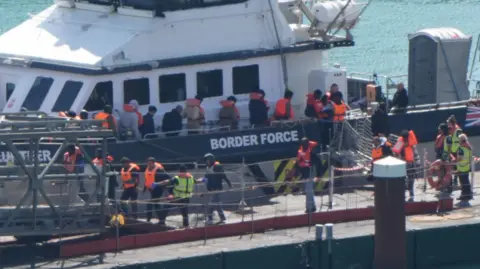On Saturday, a significant event unfolded as 435 migrants were brought to shore in Dover, marking a pivotal moment in the ongoing immigration crisis in the UK. This number, reported by the Home Office, represents the highest daily influx of migrants since the initiation of the new “one in, one out” agreement with France on Wednesday. The agreement is part of a broader strategy aimed at managing the rising number of individuals attempting to cross the English Channel in small boats, a perilous journey that has garnered extensive media attention and public debate.
The migrants, including children, were transported by Border Force and the Royal National Lifeboat Institution (RNLI). This influx coincided with various immigration protests occurring across the United Kingdom, underscoring the heightened tensions surrounding the issue of illegal crossings. Since the beginning of the year, data indicates that over 25,000 migrants have made the dangerous journey across the Channel, reflecting the ongoing challenges faced by authorities in addressing immigration.
Central to the UK government’s strategy is the “one in, one out” pilot program. This initiative allows the UK to return certain migrants who arrive in Dover back to France, with the understanding that a corresponding number of asylum seekers from France, believed to have legitimate claims to asylum in the UK, will be welcomed in exchange. The policy, while ambitious, is expected to see small initial numbers, with the first deportations anticipated to occur within weeks.
The political landscape is charged with increasing pressure on the government to take decisive action against illegal immigration. In recent days, a series of announcements have been made to bolster the UK’s response to this issue. Among these proposals is a plan to impose harsher penalties for individuals advertising illegal Channel crossings online, potentially facing up to five years in prison. Additionally, the Home Office announced the mobilization of an extra 300 National Crime Agency (NCA) officers to intensify efforts against people smugglers, who exploit the desperation of migrants and contribute to the danger of these crossings.
Compounding the situation are protests that have erupted outside hotels housing asylum seekers. These demonstrations signify the deep divisions within UK society regarding immigration policies and the treatment of those seeking refuge. The government’s response, including the new policies aimed at curbing illegal immigration, reflects a larger societal debate about the balance between humanitarian obligations and national security.
In the shadow of these developments, the National Crime Agency reported noteworthy progress in combating people smuggling. Over the past five years, the NCA has been involved in more than 300 arrests related to human trafficking and smuggling networks. Just recently, in July, six members of an Afghan people-smuggling organization received sentences totaling 26 years and 10 months in prison in France, alongside substantial fines. Rick Jones, a key figure at the NCA, emphasized the importance of collaboration with French law enforcement, stating, “France is a key partner for the UK in the fight against organised immigration crime.” This bi-lateral approach illustrates the complexities of tackling a multifaceted issue that transcends national borders.
Meanwhile, the implementation of the new migrant exchange scheme, the “one in, one out” policy, is met with skepticism regarding its efficacy. Critics question whether such a system can truly mitigate the flow of migrants or address the underlying issues driving them to seek refuge in the UK. Nonetheless, the government appears resolute in its plans, despite the challenges and ethical dilemmas that arise from the ongoing migrant crisis.
In conclusion, the events of Saturday serve as a stark reminder of the challenges facing not only the UK but also Europe as a whole in dealing with migration. The ongoing situation in Dover is emblematic of a much larger crisis that has implications for policy, society, and international relations. As the UK navigates through these turbulent waters, the outcomes of its strategies and proposals will be keenly observed both domestically and internationally. The coming weeks will be critical in assessing the effectiveness and humanitarian implications of the policies being enacted.











